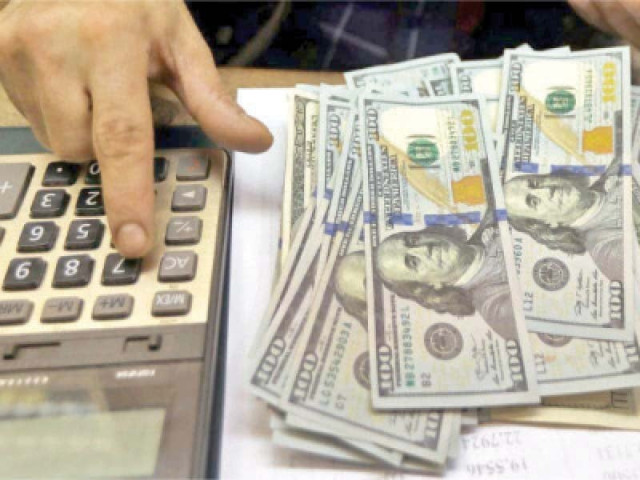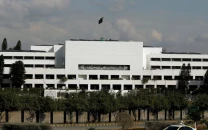Govt faces $4b financing gap despite IMF deal
Plans to bridge shortfall through support from friendly countries

Pakistan was still facing a $4 billion financing gap that will be bridged by selling stakes of listed government companies to a friendly country, buying oil and gas on deferred payments and arranging cash deposits, said Finance Minister Miftah Ismail on Saturday.
The finance minister’s remarks that came two days after a deal with the International Monetary Fund give credence to the reports that the friendly nations would help Pakistan only after the revival of the bailout package.
“In case, Pakistan goes off the mark, the lifeline will be cut,” according to the sources.
Miftah addressed a news conference along with Minister for Information and Broadcasting Marriyum Aurangzeb on Pakistan's current economic situation.
“Against the $35.1 billion gross financing requirement for the current fiscal year, there is still a gap of $4 billion that will be bridged by the end of this month,” said Ismail.
He added that a friendly country would give oil on deferred payments equal to $1.2 billion and also give its Special Drawing Rights (SDR) – the supplementary foreign exchange reserve – to Pakistan.
“Another friendly nation will give gas on deferred payments while the third friendly country is planning to buy shares of Pakistani companies worth $1.5-2 billion,” he added.
The Express Tribune had reported last month that the United Arab Emirates had refused to give cash to Pakistan and instead asked to sell shares along with one board seat of the companies whose share the gulf country would buy.
The sources said that Chief of the Army Staff General Qamar Javed Bajwa has already laid the ground for striking the deals during his recent visits to the Kingdom of Saudi Arabia, the UAE and Qatar.
The only obstacle was the delay in reaching the staff level agreement with the IMF, which Islamabad crossed on Thursday. Diplomatic sources said that all the countries had taken a stance that Pakistan should first enter into an IMF programme before getting any kind of financial assistance. The purpose was to keep the government on the course of fiscal discipline.
Ismail said that the government could also get cash deposits from a friendly country. “The country has offered to give its SDRs to the IMF and against those rights the government can get $1.5 billion to $2 billion loans,” he added. To a question whether such a transaction was possible, the minister said that in fact the process to get the IMF approval has already begun.
“Giving SDRs to Pakistan through the IMF will be part of a broad financing arrangement under the IMF deal, which is quite normal,” said Dr Nademul Haque, a former official of the IMF.
Pakistan also hopes that Qatar would increase the LNG import cargo from existing three to at least four a month in addition to giving gas on deferred payments and the groundwork was done last month, according to the sources.
Saudi Arabia that has already given $1.2 billion equal annual oil on deferred payments facility will raise it to $2.4 billion. The size of the UAE investment will depend upon the number of companies that Pakistan will offer to it for buying their shares.
“The existing privatisation law does not permit government-to-government commercial contracts and to enable the transaction with the friendly country a new law will be enacted.”
The minister hoped that the IMF deal would also unlock $3.5 billion more loans from the Asian Development Bank, $2.5 billion from the World Bank and $500 million from the Asian Infrastructure Investment Bank (AIIB).
Responding to a question, the minister said that the overall primary budget surplus target remains at Rs153 billion or equal to 0.2% of the Gross Domestic Product. He said that the IMF mentioned the underlying primary surplus target at 0.4% but also gave a fiscal adjuster equal to Rs180 billion to clear payments of the Independent Power Producers.
He vowed to exceed Rs7.470 trillion tax collection target and also collect another Rs855 billion on account of petroleum levy to achieve the overall primary budget surplus target agreed with the IMF.
The minister repeatedly deflected the question about increasing electricity prices, which the government is bound to do, if it is sincere to get the staff level agreement passed by the IMF board next month.
The minister said that the government has filed a petition with the National Electric Power Regulatory Authority aimed at protecting up to 100 units a month consumers from Rs7.91 per unit tariff increase. His reply indicated that the consumers of over 100 units will face tariff increase.
Ismail said that the IMF had estimated Rs850 billion increase in the flow of circular debt in the power sector, although the government’s calculation showed the increase at Rs280 billion. “Still, the total circular debt is over Rs2.5 trillion, which the IMF wanted to stem,” he added.
Ismail promised to end load-shedding by next summer. He also said that there will be no increase in gas prices for nearly half of the consumers; however, the richest people will face up to 235% increase in prices. He said that the IMF has not placed any condition to increase gas tariff.
To a question about constant pressure on the value of the rupee despite the IMF deal, the minister said that the rupee might get strengthened next month subject to the condition that the country’s monthly imports come down from the current $7.5 billion to $6.5 billion level.
The minister also said that after reduction in the petroleum products prices the air and rail fares have been reduced by the government.



















COMMENTS
Comments are moderated and generally will be posted if they are on-topic and not abusive.
For more information, please see our Comments FAQ